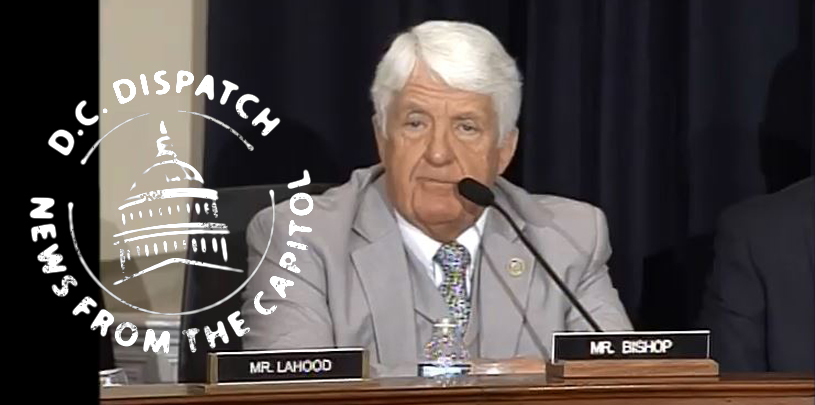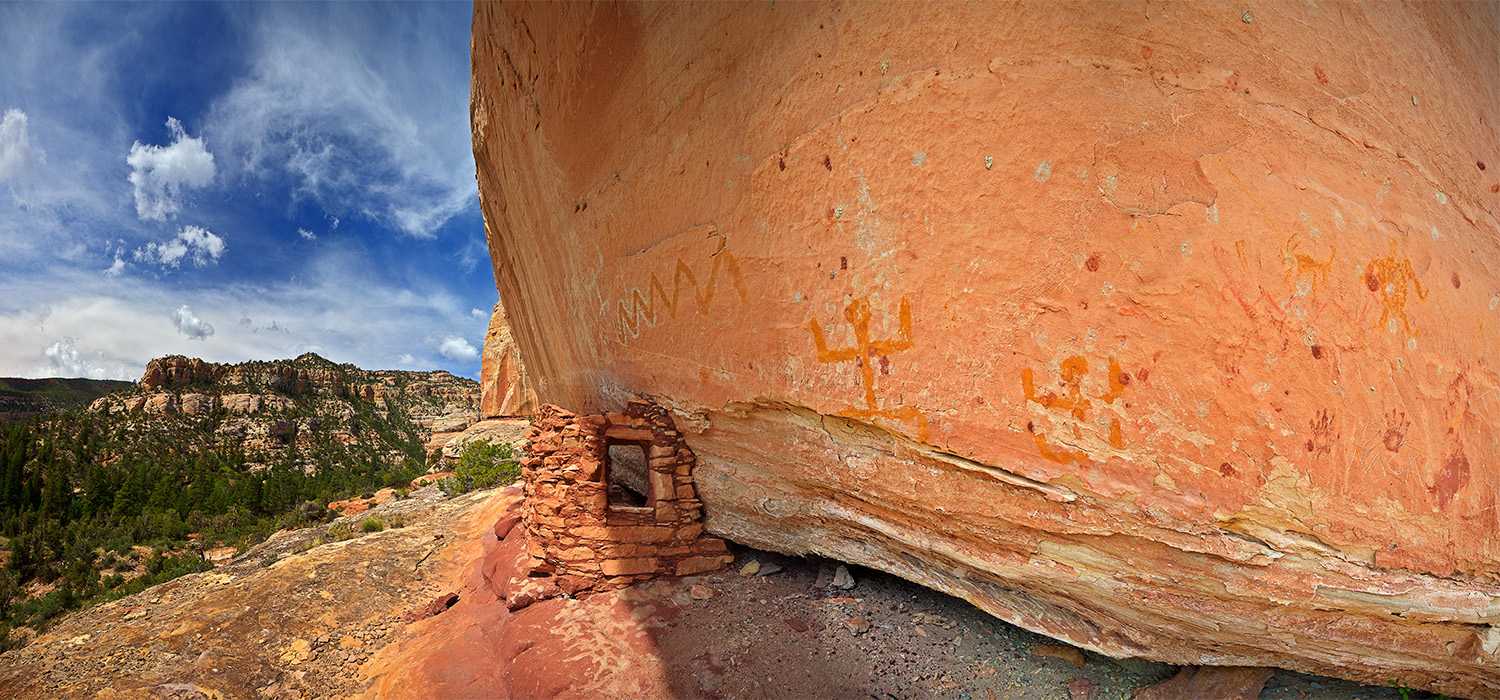
 by Tim Peterson, Utah Wildlands Director
by Tim Peterson, Utah Wildlands Director
You know that first-of-the-month feeling — bills, bills, bills! But anti-public lands bills are also piling up in the second session of the 115th Congress, and these are bills that, for the good of our public lands, must remain unpaid and unpassed. They’re designed to dismantle national monuments in Utah, to turn management of federal public lands over to county officials, and to severely limit the authority of future presidents to create new national monuments. They must not become law, and with your help, we can send them to the shredder.
The first bill has the Antiquities Act of 1906 (the law that grants presidents the authority to create national monuments) in its crosshairs, and carries a whopper of a title. It’s H.R. 3990, the “National Monument Creation and Protection Act.” Actually, it’s a protection killer that would make national monuments much more difficult to designate.
H.R. 3990, Representative Rob Bishop’s (R-Utah) bill to gut the Antiquities Act, was introduced in October. The bill, were it to become law, would arbitrarily limit the scope of national monuments to mere “relics” and “artifacts,” completely isolated from their context.
The bill would remove geology, oceans, and all other “objects not made by humans” from eligibility for national monument designation. It would also prohibit the designation of new national monuments within 50 miles of existing national monuments, ignoring science, public sentiment, and sound management practices. If the provisions Representative Bishop proposes had been included in the original Antiquities Act of 1906, Grand Canyon, Zion, Bryce Canyon, Capitol Reef, and Arches (and many other national monuments) could never have been designated.
Bishop’s bill was marked up in a hurry in October 2017 without even a hearing, and it advanced out of committee on a partisan vote. It now waits in the hopper for action on the floor of the House.
The next two bills, introduced by Utah representatives John Curtis and Chris Stewart, are designed to codify President Trump’s illegal actions slashing Bears Ears and Grand Staircase-Escalante national monuments. By introducing these bills, Curtis and Stewart are admitting that President Trump did not have the authority to repeal and replace these monuments as he tried to do by issuing his December 4, 2017 national monument proclamations. Why else would congressional action be necessary?
Rob Bishop as much as admitted Trump’s folly as well, when he told the Washington Examiner: “We need to move forward with those so we can codify what the president did and not leave it up to the variances of either judicial misinterpretation or some other executive coming in there and changing it again.” But the two bills outlined below go further than just ratifying Trump’s actions; they advance a radical agenda that turns public lands management over to the very county officials who called for the abolition or reduction of these monuments in the first place.
Representative Chris Stewart’s (R-Utah) H.R. 4558, “Grand Staircase Escalante Enhancement Act” is a grave misstep from a congressman who usually avoids the spotlight. The bill would cement Trump’s unlawful action repealing and replacing Grand Staircase while throwing up a smoke screen by proposing that a small portion of the Grand Staircase-Escalante National Monument be redesignated as the “Escalante Canyons National Park and Preserve.” But the park as proposed by the bill is unlike any previous national park, and its boundaries are a mystery — no maps have yet been provided.
The bill would cede control of the new park and preserve, as well as what’s left under national monument status after Trump’s reductions, not to the National Park Service, but to a seven-member management commission composed of a state legislator and four county commissioners who all have long histories of anti-public lands advocacy, and who have called for the transfer of ownership of federal public lands to states and counties.
Though bringing control closer to the ground may sound like a good idea, these lands are owned by all Americans, and this bill would set a dangerous precedent by putting under county control a park and three monuments that could be managed for resource extraction rather than protection of cultural and natural resources.
The bill received a bizarre hearing on December 14, 2017 in the House Natural Resources Subcommittee on Federal Lands wherein Garfield County Commissioner Leland Pollock lost his cool, and a local business owner was actually asked by Representative Stewart how much she pays her employees, then scolded to pay them more by Representative Rob Bishop.
Stewart and Bishop are both unapologetic proponents of removing public lands from American ownership by transferring them to the states, and H.R. 4558 represents a first step toward their goal. Stewart’s bill awaits markup by the full House Natural Resources Committee.
Representative John Curtis (R-Utah) replaced Jason Chaffetz, who resigned in 2016, and though he has been billed as a moderate, his second action in Congress was to introduce H.R. 4532, the "Shash Jaá National Monument and Indian Creek National Monument Act,” an affront to Native American tribes, and to the American public. The bill would make permanent Trump’s illegal action to shrink Bears Ears by 85 percent. It would also create a management body that excludes three of the five tribes with ancestral ties to Bears Ears (Ute, Hopi, and Zuni), makes appointments based on advice from Utah’s anti-public lands congressional delegation, and includes two San Juan County commissioners. The San Juan County Commission, by the way, is the entity that spent 2016 calling for the elimination of Bears Ears National Monument.
The five tribes that are suing to defend Bears Ears oppose Curtis’ bill. In a recent op-ed, Shaun Chapoose (Ute) and Carleton Bowekaty (Zuni) wrote: “Adding insult to injury, the Curtis bill employs doublespeak by purporting ‘to create the first Tribally managed national monument.’ In fact, this bill completely undermines the ability of our tribes to protect the resources President Obama sought to preserve for us indefinitely. It does so by filtering our voice through the very individuals who fought most vociferously against our tribes…In characteristic Utah congressional fashion, Congressman Curtis developed this ‘pro-tribal’ bill without ever consulting with our tribes, or any of the tribes of the five tribes coalition.”
Curtis introduced his bill on December 4, 2017, mere minutes after President Trump attempted to repeal and replace Bears Ears without talking to a single tribal government or conservation stakeholder.
There may still be time for Congressman Curtis to shelve his bill, much as Jason Chaffetz did early last year when he withdrew his bill to transfer public lands to the states.
The Curtis bill is scheduled for a hearing on January 9, 2018 at 10 a.m., and fireworks are in store. Political wonks and Bears Ears fans should tune in to the committee’s live feed next Tuesday for what promises to be an explosive hearing.
Both the Stewart and Curtis bills lack broad support, and little or no effort has been made by the two representatives to attract even partisan support. As of January 3, 2017, each had only three co-sponsors, all members of the Utah delegation in the House. Contrast that with another bill with 98 co-sponsors that should become law: H.R. 4518, the “Bears Ears National Monument Expansion Act.” Sponsored by Representative Ruben Gallego (D-Arizona), this bill would expand the boundaries of Bears Ears National Monument to match the cultural landscape as proposed by the five tribes that originally advocated for the monument. Even though it has nearly 33 times as many co-sponsors, because Bears Ears foe Rob Bishop chairs the committee in which it would be heard, it’s unlikely to receive a hearing.
In the meantime, call or email your member of Congress and let them know that you oppose H.R.s 3990, 4532, and 4558, and that they must oppose them too. Let them know that you support H.R. 4518 and would like it to receive a hearing in the House Natural Resources Committee.
2018 will be make-or-break year for our national monuments in Utah and beyond. Now more than ever, we need your support.

Cultural landscapes are full of stories, artifacts, and resources to appreciate. Here's how ›
80% of Arizona voters support Baaj Nwaavjo I'tah Kukveni National Monument, according to a new poll.
Read MoreUtah voters strongly support national monuments in general, and Bears Ears and Grand Staircase-Escalante in particular, a new poll shows.
Read MoreA small victory in the legal case challenging Daneros uranium mine, near Bears Ears National Monument.
Read More